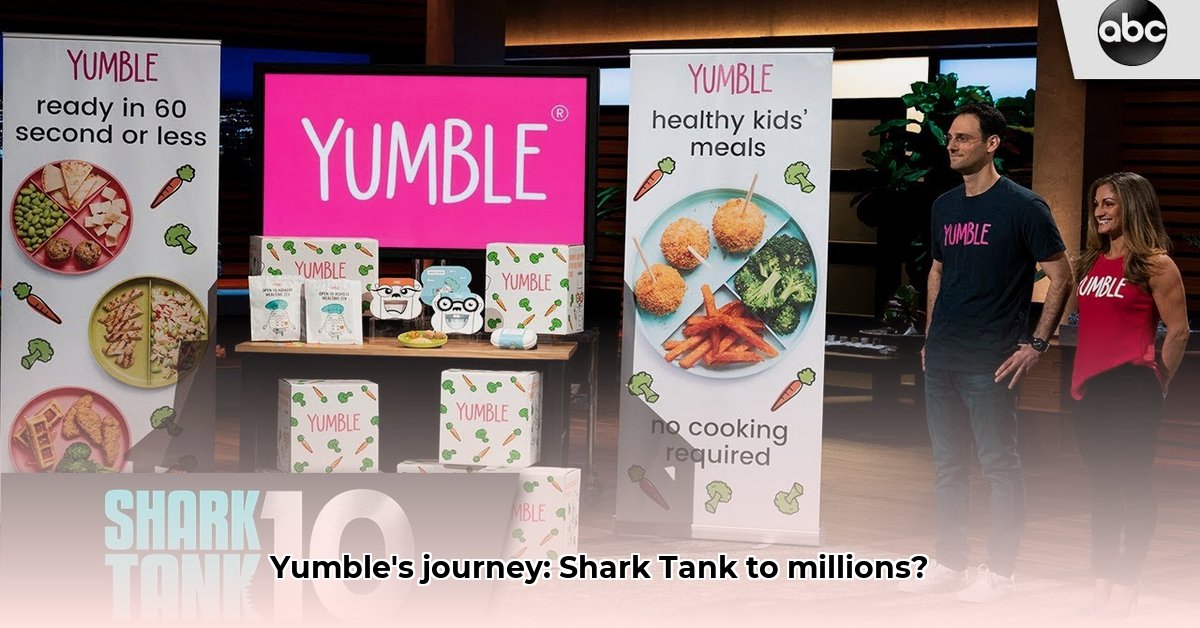
Yumble's journey, from a Shark Tank success story to acquisition by Dibz Kidz, offers a compelling case study in the challenges of scaling a food delivery business. This article analyzes Yumble's trajectory, highlighting key factors contributing to both its initial success and subsequent strategic pivot. While a precise net worth remains undisclosed, the acquisition underscores Yumble's significant value and provides valuable lessons for entrepreneurs in the children's food market. For more on Shark Tank success stories, check out this net worth analysis.
The Shark Tank Boost and Early Growth
Yumble's appearance on Shark Tank secured a $500,000 investment from Bethenny Frankel in exchange for 6% equity. This injection of capital fueled rapid growth, propelling annual gross revenues to $10 million at its peak. The company capitalized on the increasing demand for convenient and healthy children's meals, garnering significant media attention and a loyal customer base. This initial success demonstrated the potential of a well-executed business model targeting a niche market. However, this initial success masked underlying operational vulnerabilities.
Scaling Challenges and the Necessary Pivot
Maintaining the momentum proved challenging. The complexities of scaling a fresh food delivery service became apparent. Logistical issues, including sourcing, preparation, and nationwide delivery, presented significant hurdles. Maintaining consistent quality and freshness across a larger distribution network proved incredibly difficult. Furthermore, feedback highlighted concerns regarding pricing and portion sizes. By May 2023, these issues culminated in a temporary production halt, forcing a decisive strategic pivot for survival. This underscores the importance of robust operational planning and scalability in high-growth ventures. Did Yumble underestimate the complexity of fulfilling nationwide orders of perishable goods? The answer is clearly yes.
Acquisition and Strategic Shift
Yumble's acquisition by Dibz Kidz marked a significant shift in strategy. Instead of focusing on fresh, made-to-order meals, the company transitioned to a pre-packaged snack business. This pivot reflected a recognition of the inherent limitations of its original model's scalability and the evolving demands of the market. While the exact acquisition price remains confidential, the transaction itself confirms Yumble’s substantial value, based on brand awareness, loyal customers, and intellectual property associated with its recipes. This successful exit provides a testament to the ability to adapt and find alternative pathways to market success. Was the acquisition the best possible outcome considering the challenges faced? This is a key point to consider for any business facing similar struggles.
Analysis and Key Learnings
Yumble’s story offers several key takeaways:
- Scalability is paramount: The challenges in scaling a fresh food delivery operation emphasize the need for comprehensive logistical planning from the outset.
- Adaptability is crucial: Responding strategically to market changes and operational challenges is essential for long-term success. The swift pivot saved the company.
- Strategic partnerships can be transformative: Yumble's acquisition demonstrates the value of seeking partnerships and identifying strategic exits during turbulent times.
- Market research is key: Understanding customer preferences and refining pricing and portioning is fundamental.
Yumble's experience serves as a potent reminder that even a seemingly successful business model can face significant hurdles. Successful navigation necessitates adaptability, strategic planning, and a willingness to pivot as needed.
Conclusion: Navigating the Children's Food Market
Yumble's journey, although ultimately successful through acquisition, highlights the complexities of the children's food market. Though a precise net worth remains elusive, Yumble’s story underscores the importance of scaling strategies, adept market response, and the potential for strategic partnerships within the competitive landscape of the food industry. The lessons learned provide invaluable insights for future entrepreneurs in this dynamic sector. What can other companies learn from Yumble’s experience? The answer lies in planning for scalability, adapting quickly, and always seeking opportunities for strategic growth.